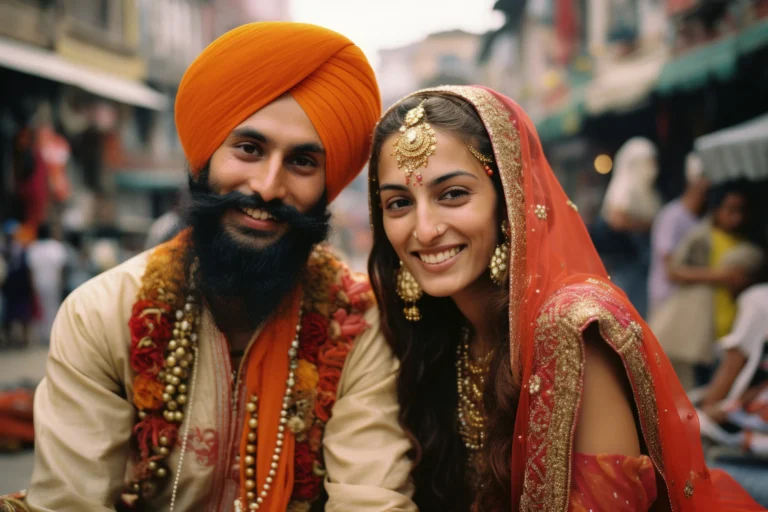In India, the turban, often referred to as a “page” across numerous Indian communities, is deeply culturally and traditionally significant, particularly at Indian weddings. It is a representation of pride, dignity, and respect. Although there are many different traditional wedding outfit options available to both men and women, men continue to favor the traditional turban for several reasons. This article will examine the cultural importance, visual attractiveness, and psychological resonance of classic turbans. The reason why men choose them for Indian weddings. Mens Asian wedding clothes combine traditional elegance with contemporary design. With rich materials and elaborate embroidery that pay homage to cultural heritage. While guaranteeing comfort and refinement for the big day.
Turban/Safa:
A “Safa,” or turban, is a customary head covering worn by men in Indian culture, especially at weddings along with additional special events. In Indian weddings, the headscarf is a highly symbolic item that represents pride, honor, and respect.
Men Wear Turbans Or Safas At Indian Weddings For Several Reasons:
- Cultural Tradition: Turbans have long been an essential component of Indian culture, especially for the Rajput, Maratha, and Sikh communities. They stand for a feeling of custom, history, and cultural identity.
- Symbol of Dignity and Respect: It is a common tradition that donning a headscarf is a symbol of decency and respect, especially on occasions such as marriage. In the past, it demonstrated that the groom is willing to take up responsibilities of marriage and parentage.
- Status and Prestige: In certain cultures, a turban’s design, hue, and material may represent a person’s social standing, level of income, or ancestry. In Sikh/ Indian weddings, for example, the groom usually dons a turban called a “pagri,” which has profound cultural and religious meaning.
- Protection and Blessings: Wearers of turbans are said to receive protection as well as blessings from them. During the wedding ceremony, it is common for family members, especially elders, to lay the turban directly. The groom’s head as a sign of their congratulations for a happy and fruitful marriage.
You can Read: Right Furniture Package
Cultural Importance:
The current trend of the turban is however not for fashion’s sake; it has a history and culture attached to it. Turban symbolises respect and dignity and it is a social status symbol in many of the Indian cultures. That is why wearing a traditional turban at a wedding is clear – the groom indicates that he is ready to assume his new roles and responsibilities in the home as well as in society.
Turban fashion varies by location in India, reflecting regional traditions and traditions. For example, the distinctive patterns and hues of the “safa” in Rajasthan, particularly “pagh” in Punjab, while the “muthiya” in Maharashtra are all connected to the local culture. Men express their identities and pay homage to their cultural heritage by dressing in a classic turban.
This Is Why Choosing The Ideal Safa Is So Important:
It Complements the Occasion: Various contexts call for different kinds of safes. A festive safa could feature fun colors and patterns, but a wedding safa calls for a regal aura. Selecting the appropriate safa guarantees that your attire is suitable for the occasion. It Tells a Tale: The rich fabric of cultural legacy is carried by the safe. Its hues, materials, and decorations can have deeper connotations that link you to history and genealogy.
Symbol Of Honor And Respect:
Many Indian tribes associate the turban with distinction and commonly wear it for major occasions, including weddings, festivals, and religious ceremonies. It is a sign of respect, particularly while taking part in customs involving elders from the family or when attending social events. In addition to improving the groom’s look, donning a traditional turban at a wedding ceremony shows respect for the families involved and the customs of marriage. The headdress’s spiritual significance increases as people frequently wear it along with family blessings.
Groom Turbans That Exude Class And Royalty:
The Golden Groom’s Tunic:
A gold turban symbolizes wealth and prosperity! It is the second most popular color for grooms’ turbans; this is also because it complements sherwanis of every variety nicely.
Pastels With Hints of Gold:
This groom is dressed in a classic photo turban in pastel peaches! The fabric also contains hints of gold! The classic turban is glammed up with a simple kali.
To Coordinate Turban With Stole:
Consider your sherwani stole or blanket while choosing what style of headwear you want to put on during the day of your marriage.
You can also Read: Cleaner Environment
Final Words – Indian Weddings:
For men attending Indian weddings, the traditional turban symbolizes tradition, cultural pride, and individual expression. It has multiple meanings. Because of its comfort, psychological relevance, and aesthetically pleasing qualities, men who want to embrace marriage’s duties while honoring their ancestry tend to favor it.

